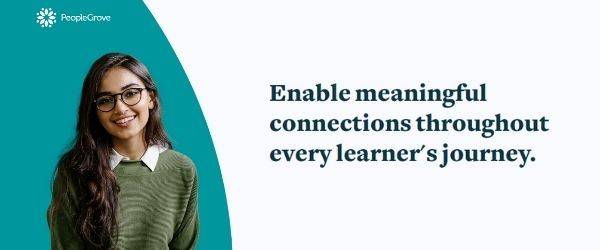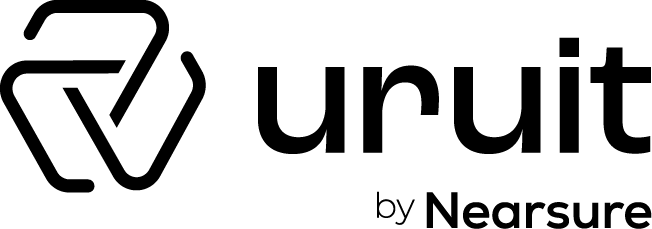Contents
Digital Talk: Tori Lund-Funkhouser from PeopleGrove
Tori is the VP of Product at PeopleGrove, an app that makes it easier than ever for students and alumni to come together, getting motivation and creating connections needed to succeed in their careers. PeopleGrove was created in San Francisco +5 years ago, and Tori has been part of the company since 2019. We talked with Tori about her career, and what she learned along the way.
How did you become a Vice President of Product at PeopleGrove?
I’ve been in product management for about seven years but didn’t start in product. I started out as a writer. Initially I was a creative writer working for a publishing company before I moved to a tech company as a technical writer on a contract. I got tired of putting lipstick on a pig for the product and was curious about who the product people were and how I could help them fix the root problem.
As I was discovering my own curiosity and interest in product, I was encouraged by my HR manager to pursue a job in product. I did, and got it, but had no idea what I was doing. I knew I wanted to fix products and make them better, and that seemed like a good place to start. I’ve had lots of roles since. I’ve worked in B2B, on a platform product at CBS, (a CMS underneath their content), in education technology, and then was recruited by PeopleGrove.
At first I was a director, both managing a team and doing a lot of individual building and contributing. Over time the team recognized the need for higher level, more strategic leadership. They promoted me to the VP position and I then I hired more people to create a larger team. The team of a dozen full-time employees is based both in the U.S. and India and now my time is more efficiently spent managing and leading.
What is PeopleGrove and what products are you responsible for?
PeopleGrove is a white labeled enterprise B2B solution (B2B2C technically). We sell to universities and currently have about 300 university partners. The product is all about helping students, young alumni or even older alumni find their next career opportunity and leverage their university networks to do so.
If a student wants to figure out what their major should be, or a graduating senior is looking for an internship, if an older alumni is seeking a career change or is looking for mentorship, guidance and support, that’s the problem we seek to solve. Because we work with university administrators and the product is white labeled there are lots of different features and toggles and configurability and customization that the buyer (the admin themselves) can do. They can customize branding on the site, do notifications via email, and there’s a lot of data they have access to.
We provide a whole set of tools around that and there’s a set of tools that are the core products. There’s the home page and we have a groups feature kind of like Facebook groups. There’s the signup experience and the inbox and a lot of features around messaging, interactions and connections. So that’s the core and then there are new businesses on the horizon being developed around enrollment.
In the same theme of the next step in your academic, professional or career path, there are users who are looking for the right college or university and trying to figure out who is the right fit. The product area is defined by the product market fit, selling into enrollment offices of schools we are already working with in this case.
Lastly, there’s an opportunity for corporations to join these membership communities and mentor students. There are a lot of different product areas going on at PeopleGrove and each product manager oversees a chunk of that territory.

What do you think makes your product and the overall experience so special?
There are a lot of other companies doing similar things in this space. There’s LinkedIn, Facebook campus, all of our competitors. There are lot of companies trying to help people with their careers. So PeopleGrove is really special in that we’re focused on helping people with their career development.
We focus on the people first, and then their connections and networks. It’s not that you develop a set of skills and then that’s disconnected from your network because at the end of the day that’s just not how it actually works. No matter what networks are important, we seek to democratize access instead of saying that you don’t really need a network and we’re just going to build up your skills in coding for instance.
Getting a career is a really windy, creative and complicated journey and you need people to help you. That is really the point of PeopleGrove and there’s a lot of opportunity within that space. I think the other thing that makes it special is the interaction with people who work at the universities. We partner with college faculty and staff to develop a platform that feels like their authentic community, that feels like their own college or university. A lot of what’s special for the students and alumni is the uniqueness of each environment. We work to capture that.
Everyone who’s in PeopleGrove for that particular school has already agreed to talk with students and alumni so it’s not like going on LinkedIn and cold emailing someone you don’t know. I’ve done this, contacting people from my small college with little success. My approach was ‘you’re in product management let’s be friends’ but they never responded even though we went to the same small college. So this is a warmer, more inviting, more intentional and ultimately more successful experience. These are the most notable pro’s of PeopleGrove as a product and as a company.
What resources helped you navigate your career change?
I worked at Udacity for a while. Udacity is a tech skills training company, and in order to become a product manager and be effective I had to learn a lot of new skills in business, in design, data etc. I used a lot of different platforms. I liked Udacity because it was the closest to the types of companies I wanted to work for—companies who were more cutting edge, so that was really effective. Also, I was attending a lot of networking events and meet-ups in San Francisco.
What meet-ups and networking events did you attend and would recommend?
I would definitely recommend the meet-up hosted by mind the product, it’s a great one. They provide a ton of resources, they’re super nice and really supportive in not only helping you understand how to build new skills, but also introducing you to people in the field. There’s also women in product which is another really great one. Attending these, getting out there and reaching out to people using various platforms is the best way to make a transition successfully.
If you have access to PeopleGrove you can go in and use it, and this is exactly what it’s designed for. You could also use LinkedIn and send cold emails and try to get people to give you advice, but as we talked about earlier this sometimes works out well and other times not.
After experiencing some success in my career people ask me for advice and unless there’s something really crazy going on I always try to offer it. Don’t be afraid to reach out and ask for help and advice, or attend meet-up’s and network in whatever way you can. Put yourself out there.
What was your biggest failure in product and what did you learn?
That’s a great question. I would say maybe rather than the specific situation it’s more like a group of things. That group would be getting distracted by revenue and wanting to keep up with sales, trying to build for solutions that will solve one need for one sale and thinking we just had to squeeze it in.
When you do that enough you have all of these different features you have to manage and it distracts the team away from what’s really important; solving the core problem for the end user and making sure the product itself is really delightful and really useful. It’s not that you don’t have to also focus on revenue, but it’s really easy to get caught up in trying to make the sale and keep up with your competitors in a feature chase rather than focusing on your own product, your own users, and what makes it special and really digging in on that.
What keeps you up at night?
There are a lot of competitors in the space. So there’s not only point solutions for one of the things the platform does, but also large competitors like LinkedIn or others who have a similar platform product. There’s so much need and there are so many problems to solve in this area. It’s definitely a lot to focus on because there’s a lot of need, but that also makes it hard to keep up, especially in a startup with a small team. I’d definitely say it’s the competition.
What is the one common myth about your profession or field that you want to debunk?
Something I hear a lot about that’s frustrating for me as a product leader is the focus on processes. There’s so much focus on questions like, ‘is this an agile process, is this the safe process, was this design thinking?’ I think that getting stuck on which process we should employ and trying to follow an outline presents a problem.
We should break down the process and think about the concepts behind it instead. What are we really trying to do here? What do we want to accomplish? Then you can mix and match processes, or come up with your own, as long as you have some steps for your team to follow. And even that might change from project to project.
Trying to over process things really doesn’t solve the problem. Relying on the principles and staying more agnostic in which process you use is more important than following a specific framework or being married to something.
Lastly, what do you love most about your work?
I love a lot of things. I love that is it’s constantly changing, that you’re never done learning and the competitive landscape changes, the tools change, the types of people who are in product changes, the customers are never satisfied and it’s just a constantly moving and evolving and growing field. It’s really fascinating. I love software. Software falls apart, then you have to find a way to fix it and you have to learn new ways of doing things. It’s just constantly moving and a really dynamic field to be a part of.


